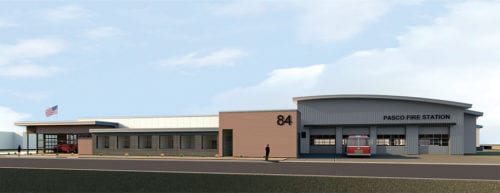
Home » City of Pasco: Affordability still key to record growth
City of Pasco: Affordability still key to record growth

October 15, 2020
Construction is booming in Pasco.
It’s because the city is an incredible value for builders, said Rick White, Pasco’s director of community and economic development.
Whether residential, commercial or industrial, Pasco is less expensive to develop than Richland and Kennewick and it promises population growth, he said.
With 77,100 residents, the Franklin County seat has been at times the fastest-growing community in Washington. In the past decade, its population has grown nearly 30%.
The Department of Natural Resources-managed land south of Interstate 182, between Roads 100 and 68, was handed over to the city last year and has filled up fast with both residential and commercial development, White said.
“It’s physically easy to develop,” he said.
Excluding schools, Pasco saw about $13 million in commercial construction through August 2019. In 2020, it was $22 million.
The city issued 319 single-family home permits through August 2020, compared to 408 during the same period the previous year. The valuation of those permits is down about $30 million, he said.
Industrial construction permits were valued at under $10 million last year, but valuations were nearly $78 million in late August 2020.
Much of that industrial work was expansions at existing food processing plants.
“Things are really hopping in the food business,” he said.
That is also making Pasco’s available farmland extra valuable.
“We have quite a bit of distribution and ag value-added product on the 395 and Highway 12 corridor. You can’t buy ag land right now. There’s none out there for sale,” he said.
In August 2020, Pasco issued 228 commercial building permits, compared to 278 for the same period the previous year, 57 industrial permits versus 48 the previous year (and 61 for all of 2019) and 1,683 single-family home permits versus 1,619 the previous year.
That brisk business during a recession is good news for the city’s $450 million biennial budget.
Keeping up with growth
More residential construction will be coming to west Pasco soon, as the sewer work for the plots north of Interstate 182 near the Columbia River are nearly complete, White said. Digging should begin by the end of the year and homebuilding could begin by fall 2021.
The city annexed land to the north so it has room to grow. The lease on the nearby gravel pit is up in 2025 and that land could be available for development soon after, “although, only time will tell,” White noted.
The new Ray Reynolds Middle School was built off Broadmoor Boulevard last year and many homes are newly finished, but Pasco had to “take its foot off the gas” on the Broadmoor master plan to first complete a state-mandated comprehensive plan update, White said. Once that is complete, further planning for the Road 100 area north of I-182 will continue at the end of the year.
Commercial land is infilling rapidly along Sandifur Parkway, with the Sandifur Crossing shopping center completed last year.
It is home to Grocery Outlet, Porter’s Real Barbecue, Planet Fitness and other tenants.
Evan Bates, general manager of McCurley Integrity Subaru on Sandifur, said the company has been pleased with the neighborhood’s growth since it opened there in 2016.
“This location presented an opportunity to build a storefront that could increase ease of access, hold a greater selection of inventory and offer amenities that we were not previously able to provide. We feel incredibly grateful that our client base has responded to this change with tremendous business growth over the last four years, and we see a similar trend continuing well into the future,” he said.
The success of the west Pasco neighborhood is an “incredibly positive sign of the strength of Tri-Cities’ economy and future prospects,” Bates said.
On the other side of I-182, the Department of Natural Resources is marketing 60 acres for development in the middle of an urban area.
Bleyhl Co-Op was one of the first businesses to build on Chapel Hill Boulevard west of the DNR land.

Danika Pink, community outreach coordinator, said the store moved from east Pasco near the cable bridge in 2018. The store serves farmers, especially those with orchards and vineyards. Being near residential growth has introduced new customers who shop the co-op for pet food, Pink said.
“We knew some of our customers would follow us over, but we’ve gained a lot of foot traffic from people in this area … lots of families coming into this location,” she said.
White said his office continues to see applications to develop 12- to 15-acre plots between I-182 and Sylvester Street off Road 100. While some of the parcels have challenges connecting to roadways and sewer lines, many are still “very attractive” to developers who make proposals to the city “all the time,” he said.
A bid to begin renovation of Peanuts Park, the farmers market and surrounding land was rejected by the city, forcing a redo of the process. The project likely will inspire new development in the downtown area, but has been delayed again, White said.
Another planned project for 2020, the new overpass for Lewis Street east of downtown, hasn’t gone out to bid yet, he said. The work will revitalize the Lewis Street corridor, but will cost $38 million, forcing the city to tread carefully.
Tierra Vida growth
The Tierra Vida community in east Pasco continues to grow, White said. The residential developer is moving forward with an education center to facilitate philanthropic initiatives and function as a kind of community center.
“It’s quite a project in itself,” White said. “There’s substantial residential development people don’t see because they’re never there.”
Hundreds of people are learning how convenient it is to live in east Pasco, White said. With close proximity to I-182, the Highway 395 corridor, Sacajawea State Park, Hood Park, the Port of Pasco and downtown Pasco, Tierra Vida’s single-family and multifamily homes built over the past two years have been successful, he said.
Tierra Vida was built by the Jubilee Foundation, an organization founded by the family that owned Broetje Orchards, based in Prescott. The Jubilee Foundation built 250 homes in east Pasco and its apartment complex has 140 units, said Roger Bairstow, executive director.
The foundation does more than build homes. After welcoming families into the units, the organization works with residents to improve their lives, Bairstow said.
It is building is a 30,000-square-foot community center at the corner of A Street and Tierra Vida Lane near Highway 12.
The center will house foundation offices and its sister groups, one overseeing a Christian elementary school and international grants and another offering leadership training with a focus on workforce development, Bairstow said.
The building will have an auditorium for community education events.
The foundation’s construction projects in east Pasco are almost complete, and the organization is eyeing new locations to build.
“We would like to invite another community to work with us. We seek to settle where people are more marginalized and vulnerable and to set up camp to bring up the neighborhood of people,” Bairstow said.
Construction + Real Estate
KEYWORDS october 2020





